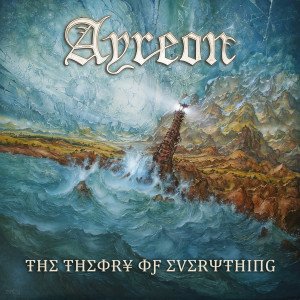 Of all of Arjen Lucassen’s projects, Ayreon is his best known and my least favorite. Having previously given both The Human Equation and 01011001 a shot, Ayreon really was a nut I couldn’t crack. Partially this is because I think the rock opera genre of power/prog metal bands à la Avantasia or Timo Tolkki’s Horrible, Terrible, No Good, Very Bad Avalon tend to lack vision; but the writers also lack the kind of talent necessary that make undertakings like Jesus Christ Superstar or Little Shop of Horrors fun and interesting1. However, since 2009, I’ve developed quite a love affair with Arjen’s music. So it was with this love of Arjen’s style and artistic sensibilities that I started listening to The Theory of Everything.
Of all of Arjen Lucassen’s projects, Ayreon is his best known and my least favorite. Having previously given both The Human Equation and 01011001 a shot, Ayreon really was a nut I couldn’t crack. Partially this is because I think the rock opera genre of power/prog metal bands à la Avantasia or Timo Tolkki’s Horrible, Terrible, No Good, Very Bad Avalon tend to lack vision; but the writers also lack the kind of talent necessary that make undertakings like Jesus Christ Superstar or Little Shop of Horrors fun and interesting1. However, since 2009, I’ve developed quite a love affair with Arjen’s music. So it was with this love of Arjen’s style and artistic sensibilities that I started listening to The Theory of Everything.
At first, my initial negative estimation of the project was confirmed. The music flowed well and reminded me of Guilt Machine and Lost in the New Real quite a bit, but there were no hooks. Instead of being drawn in by the music, the first thing that stood out to me about The Theory of Everything was the lyrics. Unfortunately, those lyrics made me cringe. As I listened, I noticed that Tarot-frontman Marco Hietala was really getting shafted with lines like: “Don’t believe him now / He’s envious / I’ve felt it from the start / I’ve always been the genius / And he just wants to be like me” and “Oh no, I can’t believe you’re falling for this loser / Oh no, I thought you knew that I am so much cooler” from “The Teacher’s Discovery” and “Love and Envy,” respectively. These lyrical sore spots stood out as I listened to the record repeatedly. After lyrics like “If he could concentrate he could help me / he might even be of some use” and “I have to confess, it’s experimental / Still running through the tests / The side-effects could include extreeeme delusions!2” from “Diagnosis,” I was pretty convinced that TToE was going to be a big loss for me. Apparently Arjen had used his lyric-writing hammer to craft this album3.
 But a funny thing happened on the way to trashing this album: I kept hearing stuff I liked. Repeated themes started creeping under my skin and vocal performances started to stick. Arjen’s choice in musicians and—especially—vocalists makes TToE a special record. The main character, The Prodigy, is played by Tommy Karevik and he’s good, but the supporting cast is even better. Aforementioned Nightwish bassist/vocalist Marco shines as The Rival (regardless of content), while JB from Grand Magus delivers an equally fine performance as The Teacher. Cristina Scabbia (Lacuna Coil) is convincing and evocative as The (Prodigy’s) Mother. But for me, the heights are Michael Mills from proggers
But a funny thing happened on the way to trashing this album: I kept hearing stuff I liked. Repeated themes started creeping under my skin and vocal performances started to stick. Arjen’s choice in musicians and—especially—vocalists makes TToE a special record. The main character, The Prodigy, is played by Tommy Karevik and he’s good, but the supporting cast is even better. Aforementioned Nightwish bassist/vocalist Marco shines as The Rival (regardless of content), while JB from Grand Magus delivers an equally fine performance as The Teacher. Cristina Scabbia (Lacuna Coil) is convincing and evocative as The (Prodigy’s) Mother. But for me, the heights are Michael Mills from proggers Toefinder Toehider, whose voice is incredible and performance is on par with Ian Gillan’s rendition of Jesus in Jesus Christ Superstar. John Wetton (Asia, and like every great English prog band ever) is brilliant in his role as The Pyschiatrist — and offers a nice dose of non-tenor male vocals with his so-damned-rock n’ roll voice. Finally, Sara Squandrani from Italian cheeseballers Ancient Bards also really delivers a top notch performance and has a voice I hope to hear elsewhere again. All of this without mentioning the all-star cast of musicians involved (Rudess, Warby, Wakeman, Hacket, Emerson, and that guy who plays flutes for Nightwish now).
This combination of Arjen’s unique writing style and these virtuoso performances makes for a remarkably enjoyable listening experience as the themes and the flow of the record start to really sink in. The Theory of Everything is essentially two 45 minute songs, and the scenes are laid out with musical interludes in between. These short pieces form sometimes what feel like whole songs (“Alive!” flows right into “The Prediction” for one of the heights of the record, for example), and sometimes they feel very separate on their own (“Progressive Waves” is dedicated to ’70s prog with copious references to Jethro Tull, Yes, Rush, and Camel). The tracks can also be similar to intermezzi (like “The Parting” or “Inertia”). The music feels very “Arjen”—almost bordering on self-quotation at times—while evoking a lot more prog than I recall earlier Ayreon records to be. There are moments when Lucassen’s heavier side breaks through, but most of this material is rooted in hard rock and more complex art rock, to great effect.
Once the threshold was crossed, The Theory of Everything was addictive. Despite the occasionally embarrassing vocal parts, I started listening to the album non-stop. On the way to work, when I was doing Angry Metal Housework™ or working out, I was constantly listening to The Theory of Everything. Musically it’s so engaging, and patience with it is incredibly rewarding. Hearing the themes repeat in “The Prodigy’s World,” and “Inertia,” or in “The Argument 1” and “The Argument 2” or the “Theory of Everything” tracks makes the album feel a lot more like a classical piece of music than a rock n’ roll record. In fact, the special edition of the album has the tracks without vocals and I would definitely be interested in hearing this, as I’ll bet it would be equally as entertaining in its own right.

On the negative side, however, two major things stand out. First, there’s a lot more “intermezzi” than arias, which leads to a problem for some listeners. One of the biggest complaints I’ve heard about the record is that Arjen needed to “cut out the filler.” This critique is essentially—as I interpret it—that there are no traditional songs on this album and people aren’t really sure what to do with themes and intermezzi. The Theory of Everything isn’t accessible, despite Arjen’s amazing melodies and writing. In my experience, however, this is just about time and familiarity; with time, you start to become familiar with the contours of the record and it’s very giving. Second, while music trumps lyrics, the story on this thing bugs me for a couple of reasons and is really interesting for others. I’m going to get into that into a review aimed specifically at the story at a following date.
For the discriminating progger, however, The Theory of Everything is a triumph. The writing is stellar, the performances are unworldly (Michael Mills!), and the feel is perfect. Arjen’s production is always excellent, though in my opinion it could probably have been even more dynamic with less compression. If you’re a fan of prog or a fan of Arjen, this record is definitely one for you. Have some patience, give it some time. It’ll grow—and when it finally sets down roots, it’s a keeper.
Rating: 4.5/Guilt Machine
Label: InsideOut
Release Dates: US: 10.29.2013 | EU: 2013.10.22
Websites: arjenlucassen.com | facebook.com/arjenlucassenofficial

















